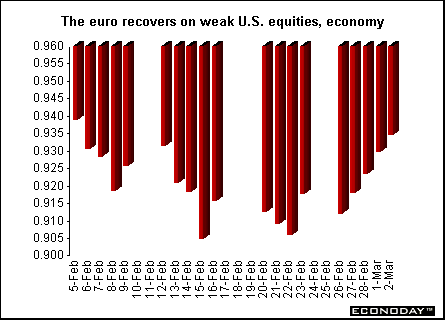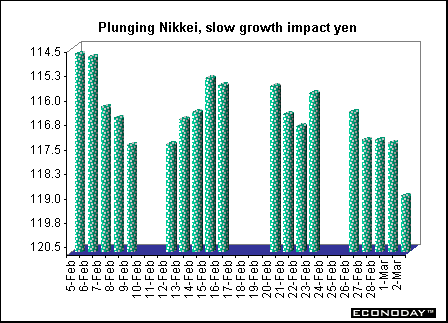
Currencies
The euro seemed to begin the week under continued pressure because of a host of reasons, foremost of which was contagion (financial) from Turkey and fears that an outbreak of foot and mouth in Britain might spread to Europe. Despite a statement early Monday morning by Moody's Investors Service stating that it does not believe that individual exposures to Turkey will lead to negative rating pressures for German banks, traders remain fearful that fallout from Turkey may translate into problems for German banks, and therefore the euro. The degree of public disclosure from German banks remains low, thus amplifying market perceptions of possible inherent risks faced by the banks. But dismal U.S. news finally dragged down the dollar, and the euro improved to end the week near a four week high.

Fourth quarter growth in both the United States and Germany came out below original forecasts, the United States at 1.1 percent and Germany at 0.2 percent. Both (economies) are slowing, but with a pro-growth Fed and tax cuts in the works, it still looks like the U.S. will beat Germany (which accounts for about 32 percent of the EMU) in the growth sweepstakes, even if it compares less well with the entire EMU.
The yen slipped to its lowest level in almost six weeks against the dollar and euro as Japan's Nikkei 225 stock average fell, prompting foreign investors to sell shares. The yen also declined on concern the plunge in stocks may push some banks into insolvency. Banks, which tend to have large equity holdings, are burdened with an estimated 33 trillion yen ($280 billion) of bad loans, according to the Financial Services Agency.

Bad economic news was abundant. Industrial production fell and a report showed consumer prices in Tokyo declined during February, suggesting the nation's two year bout of deflation may be getting worse.
The Bank of Japan's move to cut interest rates by 10 basis points failed to impress the market. Analysts think that changing monetary policy alone won't be enough to boost its economy. Rather in order to cleanse the still open wounds from the bubble economy, the government needs to do something about banks' bad loans and needs to use public funds for economic stimulus.


Introduction • Global Stock Market Indexes • Recap of Global Markets • Currencies • Indicator Scoreboard

The Bottom Line • Looking Ahead
|